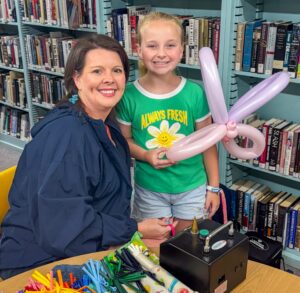Out for blood: LifeSouth continues life-saving mission
FRANKLIN LIVING MAY-JUNE 2023
Stepping into a LifeSouth bloodmobile means stepping inside a place where the healthy are sacrificing so the sick and injured can survive.
Perhaps it’s not always so dire or dramatic, but the fact remains that blood donors are the crucial to providing the lifesaving blood needed by people in all kinds of situations – car accident victims, cancer patients, chronic illness sufferers, people in surgery and more.
“When you donate blood, it’s a selfless act. You might get a shirt or a snack, but you’re really doing it to help save a life,” noted Becky Cecil, district community development coordinator for LifeSouth. “If the blood is not available when you need it, there’s not a plan B. If you don’t have it, there’s nothing else you can do.”
Cecil, who works in Marshall, Morgan and Madison counties and the Shoals region, including Franklin County, said touring LifeSouth’s headquarters when she began working for the nonprofit this past year really opened her eyes to the behind-the-scenes work as well as the constant, crucial need for willing donors. That’s why promoting and holding LifeSouth blood drives remains so constant to answer the need.
“We had 48 blood drives and 760 donors in Franklin County in 2022,” Cecil noted. “Our components lab in north Alabama processes approximately 200 donations per day.”
Big drives in Franklin County include those at the county schools as well as at Franklin Homes and IHP. Russellville Hospital is also a frequent site for drives – which makes sense, since LifeSouth is the sole supplier to meet the hospital’s blood needs.
“All of our supply of blood comes from LifeSouth. This community really relies on it,” explained Talea Ray, lab director at Russellville Hospital. “I try to donate every time they come.”
Ray said Russellville Hospital administers on average 30-50 units of blood per month. In 2022 the hospital administered 458 units – to trauma patients, anemic patients and others. The hospital also administered 19 units of platelets and nine units of fresh frozen plasma. Ray said they tend to keep about 25 units on hand.
Jessie England serves as donor recruiter for the region. She coordinates blood drives, disseminates promotional materials and finds new potential blood drive locations.
“She knows the area very well,” Cecil noted. “She knows it in and out – the people, the businesses, where to go to get a really healthy blood drive.”
Cecil said while about 37 percent of the U.S. population is eligible to donate blood, only about 10 percent do annually. That gap can be a strain on the blood supply available to those in need. “It’s a life-or-death matter if it’s not there when somebody needs it. That’s a huge reason to donate,” said Cecil. To anyone fearful about giving blood, she has one simple piece of advice: Try. “Find a drive near you or a donor center near you and try to donate,” she urged. “Try to make that difference in someone else’s life. One donation can potentially save up to three lives. That’s a huge impact. It’s something we really rely on.”
Ray said while blood donation used to bring up health and safety concerns for some folks, today it is an incredibly safe, closely regulated, meticulously carried out process. “At one time people worried about hepatitis or HIV, but now those units are screened for any infectious disease,” she pointed out. “We monitor the temperature of the units continuously to make sure there is no bacterial infection. We retype the units when they arrive to double check they were typed correctly, and we cross match to make sure it’s compatible with the patient.”
Ray said people might also be concerned about the time commitment, but “it’s a pretty quick process. I would say you’re in and out in 30 minutes.”
That was true for Randy Watson, a donor at the Russellville Hospital drive in April. “I want to help folks whenever I can. I was in the Army, and I always donated when I was in the Army,” explained Watson, 58, a resident of Russellville. “It’s a good tradition to keep up.” Watson said in addition to helping those who might need blood, donating helps him too – it was recommended by his doctor, and he always feels better afterward.
Cecil said she would encourage reluctant donors to think about how they would feel if they found themselves in a position of needing to receive blood. “I think if I was in that situation and needed blood or a blood product, I would want it there,” Cecil said. “That’s why I donate – and if I was in that situation, I hope somebody else would do that for me.”
LifeSouth, based out of Gainesville, Fla., serves 17 hospitals in north Alabama alone. Cecil said this part of the state is also the biggest donor base for LifeSouth overall.
Becoming a donor is a pretty straightforward, simple process. Willing donors can simple find a donor center or a drive online. Donors must have a valid photo ID and be at least 17, or 16 with signed parental consent, at least 110 pounds and in good health. People are unsure whether they are “in good health” needn’t worry.
“After you register to give blood, we do a mini physical and questionnaire,” said Cecil, explaining it includes a long list of questions to make sure a donor is healthy and in good condition to give. Donating frequency is also limited for the donor’s wellbeing – every eight weeks for whole blood, every four weeks for plasma, every two weeks for platelets and every four months for double red. “It’s giving your body time to regenerate what you just donated,” Cecil explained. “It’s a safe window to make sure your body has time to replenish what we took out through your donation.”
Safety is also key when it comes to drive locations and employees, who are all rigorously trained. “Safety and quality and the comfort of our donors is high on the list,” Cecil said. “We want all of our donors to feel they are safe and in a comfortable location.”
As summer approaches, LifeSouth enters a time of the year when donations are often in a slump, while the need is often at a peak. Cecil, England and other with LifeSouth will continue their unyielding efforts to recruit donors, plan drives and save lives.
“We’re so thankful to all the people who are willing to let us bring a bus out,” Cecil said. “That’s our lifeblood – having organizations that are willing to back us, let us bring a bus, support our mission and get blood donors in.”








